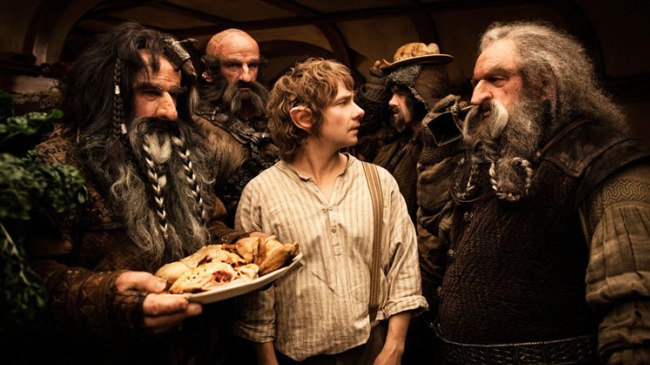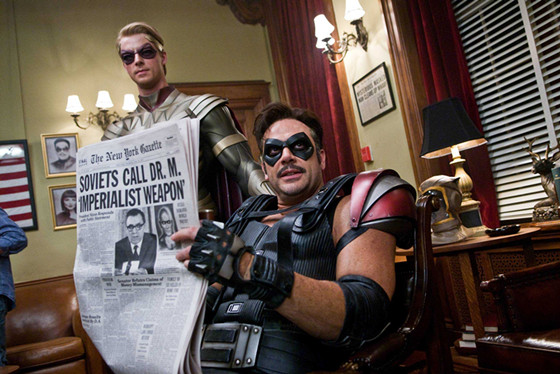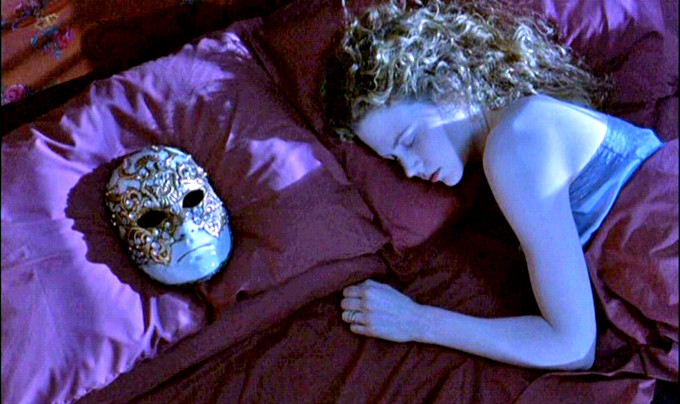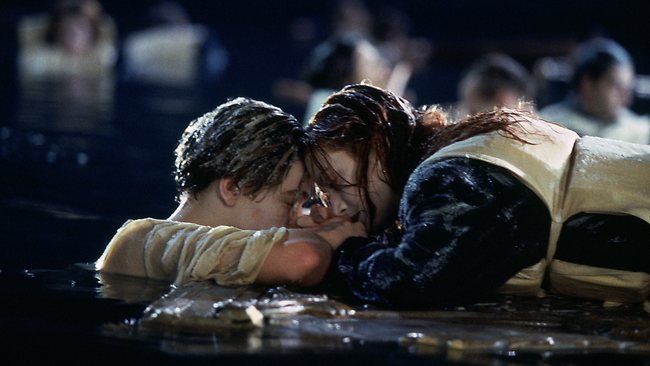6. The Hobbit (474 mins)

Having changed the landscape of fantasy cinema with The Lord of the Rings at the turn of the century, Peter Jackson’s return to Middle Earth storytelling could not have been more highly anticipated. However, lightning does not strike twice; news that Jackson was going to spread a three-hundred-page book across three films increased fan’s nerves.
The solution was to inject the narrative of the book with aspects of the Appendices of Tolkien’s Lord of the Rings; however, this only managed to create a strange tonal balance between the fun adventure of The Hobbit and the weightier backstories of the Appendices.
This is a story that could have simply been told in two films (the third film is adapted from a few lines of The Hobbit) but there are too many moments in the trilogy where the narrative grinds to a halt. It creates a jarring effect on the smoothness of Jackson’s storytelling, an issue that was never problematic in The Lord of the Rings.
Jackson and his screenwriters took far too many liberties when adapting the story of The Hobbit, squeezing in fan favourites from The Lord of the Rings in ways that were either far too convoluted or simply silly. An Unexpected Journey had moments of childish humour clashing with darker scenes.
The latter wanted to have the tone of Lord of the Rings; when he gets that moment right (riddles in the cave with Gollum, for example, is easily the standout scene in the trilogy) the greatest urge is to watch The Lord of the Rings again.
Had The Hobbit simply focused on telling the story of the book, it could have been a success. Martin Freeman plays Bilbo Baggins with a mixture of excitement at adventure but weariness to go anywhere. Ian McKellen is quite simply perfection as Gandalf the Grey, but it is the desire of Peter Jackson to repeat the epic scale of his previous works that is the downfall of The Hobbit trilogy. The Battle of the Five Armies is adapted from a single page of Tolkien’s text and it shows, pulling a curtain over the trilogy that was one whole film too long.
7. Avatar (162 mins)
![]()
James Cameron’s sci-fi fantasy is unquestionably a landmark in visual cinema; his creation of the world of Pandora is still magnificent, with the attention to detail of the vegetation and landscape utterly eye-boggling. The Na’avi are beautifully designed, and Cameron depicts their lives with an evident vibrant love for his creations.
The attention to detail is highly commendable, of course, but it pinpoints the faults in Cameron’s script and the failure to create an original narrative. This failure shows a story that feels like it was created by a preaching man who disguises a lecture about deforestation with a colourful presentation.
In terms of depicting fantasy cinema, Avatar is peerless, with action sequences that use the surrounding environment to sensational effect, however Cameron’s wings need clipping and to make this film truly great, his clunky expositional dialogue should have been trimmed to make way for a more thoughtful script.
8. Watchmen (163 mins)

It is evident that director Zack Snyder is a great fan of the comic book source Watchmen; from the film’s opening sequence, it becomes clear that he takes huge influence from Alan Moore and Dave Gibbons’ work, as it almost perfectly mirrors the first few pages of the acclaimed graphic novel.
Unfortunately, this is also the main flaw in Snyder’s adaptation. His desire to show the graphic novel on screen means that the film fails to explore character depth, taking the audience from point A to point B, without channelling the emotive fuel that drives the character arcs.
Certain early sequences capture the chaos and disorder of an alternate 1985, where Dr Manhattan has enabled the American forces to win the war in Vietnam but the Doomsday clock inches closer to midnight. The source material manages to show the difference between the Minutemen of the 1950’s and the Watchmen, however examination of the changing times in American history only plays out in the first act, until the film abandons it to focus on a central theme concerning a dead vigilante.
Snyder seems to think that an epic film is a film that has a very long duration, telling a grand story with events constantly pushing the narrative forward. However, this brings a sense of weightlessness that makes the film more homage than adaptation.
One feature of the graphic novel, the comic-within-a-comic Tales Of The Black Freighter, is available with the film that takes the run time to over four hours, which adds to the length but not to the depth and relevance of the story itself.
Given Snyder’s filmography, surface level cinema seems to be his forte, and his ambitious attempt to adapt the “unfilmable” graphic novel puts his weaknesses as a storyteller front and centre. Watchmen begins with great potential and the idea that it could be done right, but it loses its nerve too early on and cannot be reigned back in.
9. Eyes Wide Shut (165 mins)

Stanley Kubrick’s final film is a sexually charged odyssey focusing on a ridiculously wealthy couple who explore their sexual lives and fantasies. It adheres to Kubrick’s trademark of making disturbing material engrossing. However, whereas A Clockwork Orange and Dr Strangelove somehow managed to bring a jet-black humour to proceedings, Eyes Wide Shut is comic in fewer places, with the attempts at biting satire coming to the surface far too rarely.
While the film is marketed as a double act for Tom Cruise and Nicole Kidman, her lack of screen time, particularly in the second act of the film, is unfortunate, as her presence and chemistry with Cruise make for the most enthralling sequences in the film.
It is understandable that Eyes Wide Shut is highly lauded, due to it being the final film of a true master of the cinematic arts, yet it never meets the expectations that a Kubrick film sets itself, and its tendency to take large chunks of time in between its most powerful scenes means that it ultimately falls short of the director’s best work.
10. Titanic (195 mins)

The main reason Titanic is spoken about nowadays is from people on the internet attempting to prove that both Rose and Jack could have fit on the floating wreckage in the film’s final act, Celine Dion’s voice and a steamy sex sequence in a car- highly outlandish for a film that achieved a family friendly rating at the time of release. Due to this fact, it is easy to forget the huge impact that Titanic made upon its arrival in cinemas, with the extraordinary box office success that it made.
The reason for the rest of the film not being spoken about much more is that the storylines surrounding Titanic’s extraordinary capsizing sequence add little emotional weight to the historic tragedy. Everything about the film is elevated as the HMS Titanic hits the iceberg, as Cameron depicts the pure terror and chaos that unfolds onboard. The pandemonium on the upper deck is artfully juxtaposed with the quiet resignation of those going to bed in the lower decks.
A present day opening sequence in which an older Rose travels down to the wreckage of the Titanic plays more like a television docu-drama than the start of a cinematic epic, while the relationships on the ship itself are irritatingly soapy; the themes of class divide meekly plays out through some questionable Cameron dialogue. There is no doubt that James Cameron can write (his script for Terminator 2: Judgement Day is note perfect), yet here he lets events drag on for too long before getting to his showpiece sequence with the sinking of the ship.